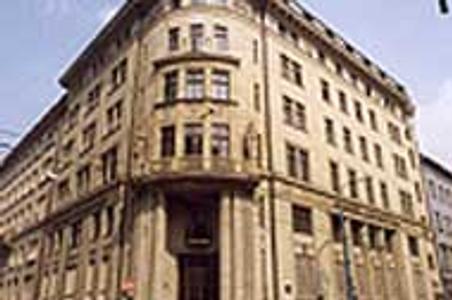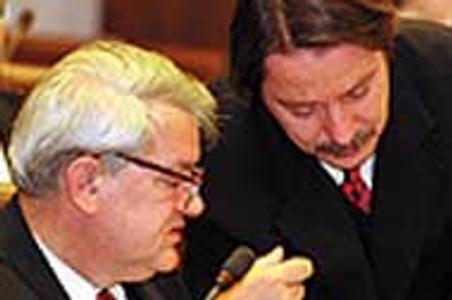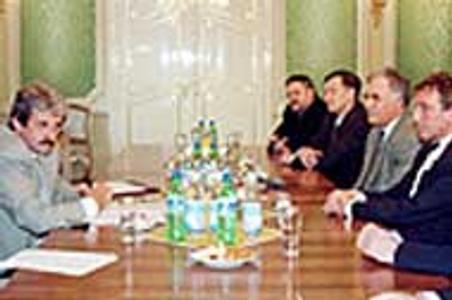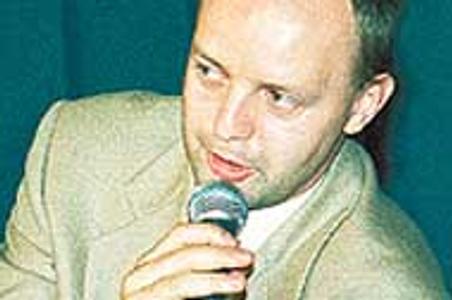Archive of articles - June 1999, page 2
If you desire to read an old article, use the search bar or select the publication date.
Telecom Minister Palacka sets an unwelcome precedent
While Telecom Minister Gabriel Palacka did not deserve the fatuous media charges of bribery laid against him in connection with the GSM 1800 mobile phone tender, his handling of the issue did raise several rather large and disturbing questions which remain unanswered.The first question is why he decided to abolish the tender commission on June 7 and decide the issue himself. The commission, which was composed of telecom experts and was responsible for deciding which firm should be given a license for operating a third mobile phone frequency in Slovakia, gave the tender process at least the appearance of objectivity.
Pivotal IRB sale delayed by government indecision
Last minute differences between the cabinet and the National Bank of Slovakia on June 17 delayed the approval of a plan to privatise Investičná a Rozvojová Banka (IRB), the weakest of Slovakia's state banks that is slated to be sold by October this year.Finance Ministry spokesman Peter Švec told The Slovak Spectator that after a marathon cabinet session which began on June 16, "negotiations are still continuing between the central bank and the Finance Ministry." Švec would not specify why the IRB sale had not been agreed, saying only that the two sides had several wrinkles to iron out.
State-owned joint venture to control Nafta Gbely
The massive underground gas storage facilities of Nafta Gbely and its sister firm Nafta Trade may soon be dangled in front of foreign investors again - this time as the property of a newly created joint venture known as SPP Slovakia.The joint venture will unite the state gas monopoly SPP with the FNM state privatisation agency, each of whom will have a 50% stake in SPP Slovakia. The new company will control a 45.9% stake in Nafta Gbely and a 100% stake in Nafta Trade; the former has been taken back from former owner Druhá Obchodná through the courts, while the latter remains 75% in the hands of the Aral company.
Fearing dioxin, Slovakia bans selected EU imports
Slovakia joined the widespread concern over foods contaminated with the posion dioxin, announcing on June 11 it had banned selected food imports from four European Union countries.About 30 countries have withdrawn Belgian products in the more than two-week old crisis over dioxin contamination of some meat, eggs and dairy produce, stemming from tainted animal feed. Some states have imposed wider bans on all poultry and pork from EU nations.Minister of Agriculture Pavol Koncoš told a news conference that Slovakia had temporarily banned imports of livestock and various meat products, eggs, milk and dairy products from Belgium, France, the Netherlands and Germany.
Telenor and LucidLight battle over e-mail 'spam'
Slovakia may soon see its first legal battle over an issue that has blighted western Internet markets for years: unsolicited e-mail, less formally known as "spam."The suit, which has yet to be filed, pits Telenor Slovakia, a subsidiary of the Norwegian IT giant Telenor, against LucidLight, a Slovak company specialising in direct marketing through e-mail and a subscriber of Telenor's service. The former claims that LucidLight was spamming, an activity which could make the provider an international Internet pariah, and which it punished by restricting the plaintiff's access to the Internet. LucidLight says that Telenor broke their contract without justification, and is suing for damages.
Right-wing parties still languish
Almost 10 years after a revolution put an end to communist rule in Slovakia, left-wing parties retain a chokehold on Slovak political life, while their right-wing counterparts struggle to find both an identity and a voice.Social democratic parties currently dominate the government. The reformed communist SDĽ, the second strongest coalition faction, holds the Finance, Agriculture and Labour Ministries, as well as the post of Parliamentary Speaker. The SOP junior coalition partner controls the Privatisation Ministry and on June 15 had its leader, Rudolf Schuster, installed as President.
'Strategic' companies to be sold
Parliament is set to scrap a ban on the privatisation of Slovakia's largest state-owned companies, including banks, utilities, telecom and transport operators. An amendment to the Law on Large-Scale Privatisation was approved by cabinet on June 3 and is to resume debate in parliament on June 29. If approved, it could pave the way for what the government hopes will be a boom in foreign investment in former state firms."The government wants these companies to be privatised so that they can be restructured and released from state control," said Vladimír Zlacký, an advisor to the Deputy Prime Minister for Economy Ivan Mikloš. "There is no fixed time line for the state companies to be sold - we are looking at the mid-term horizon," he added without volunteering further details.
State media posts major losses
The TASR news agency, Slovak Television station, and Slovak radio all posted losses of millions of crowns in 1998, with STV by far being the biggest loser, the Parliamentary Committee for Culture and Media heard on June 8.The Slovak Television (STV) posted a total loss of 215 million crowns in 1998. This is following a 124 million crown loss in 1996 and 245 million crown loss in 1997, STV director Milan Materak said.Decreased income from advertising resulting from lower ratings of the STV negatively influenced the financial situation of the public broadcaster. This resulted in reduced purchases of foreign TV programs and an unbalanced broadcasting structure, Materak said.
The open soul
The final act in the drama staged at Markíza TV - with the main role played by Markíza General Director Pavol Rusko and the main theme being the role of power and money - was staged in an open letter addressed by the 'General' from Záhorksa Bystrica to Interior Minister Ladislav Pittner after the minister announced several generally-known facts about the Ukrainian 'kids' surrounding Rusko."The mafia finally left Markíza in October 1998," Rusko wrote in the letter. In the next lines it becomes clear that he is talking about the people surrounding the Gamatex firm of Marián Kočner, who attempted to wrest control of Markíza from Rusko last fall. If Rusko calls Kočner's group mafia, he probably knows what he is talking about. The question is why he held a press conference with this same Kočner before elections, and why he offered Kočner a financial settlement for leaving Markíza.
Culture Shock: Nylons in summer an accepted fashion sin
At first, I wasn't quite sure why I kept staring at women's legs in Bratislava when the weather here started to get warm. Perhaps, I thought, I was somehow mesmerised by how thin some of them were, thin as ballet dancer's legs up to the edges of their impossibly short skirts. Or maybe I was shocked by how young women would strap their feet into heels so high and uncomfortable even when just going to class or out for a coffee with a friend. I found myself particularly disturbed by the sight of the fully done-up Slovak young woman (short skirt, high sandals, see-thru polyester shirt or crop top) towering proudly on the arm of a shorts-and- sneaker-clad boyfriend who obviously couldn't care less about what he looked like.
- Top 10 events in Bratislava for foreigners
- Weekend: Celebration of fun comes to Malacky Photo
- No more photos or bank statements? Slovakia moves to ease residence process
- Slovakia loses another EV model to Spain as Stellantis chooses Zaragoza over Trnava
- News digest: Prosecutor seeks jail for NBS Governor Kažimír as his political support wanes
- Maria Theresa on the banks of Bratislava
- News digest: Fico’s bloc wants to save money by restricting electoral access
- Paris leads, Bratislava trails: European cities ranked on safe travel for children
- Maria Theresa on the banks of Bratislava
- No more photos or bank statements? Slovakia moves to ease residence process
- Weekend: Celebration of fun comes to Malacky Photo
- Top 10 events in Bratislava for foreigners
- News digest: Fico’s bloc wants to save money by restricting electoral access
- 3 free things to do in Bratislava in the next seven days
- Digital Jarvis is real now. He is coming for your to-do list
- Slovakia plans to restrict access to new medicines amid funding shortfall
- Maria Theresa on the banks of Bratislava
- No more photos or bank statements? Slovakia moves to ease residence process
- News digest: Violent gang in Bratislava is under arrest
- The Kremlin’s security agency has a Russian contractor in Slovakia - no one has noticed
- 3 free things to do in Bratislava in the next seven days
- Weekend: Celebration of fun comes to Malacky Photo
- Digital Jarvis is real now. He is coming for your to-do list
- Top 10 events in Bratislava for foreigners
- Maria Theresa on the banks of Bratislava
- A mayor resigns over €2.7 million fraud scandal at town hall
- Show me your moves! Slovak hockey stars share their best pick-up lines
- No more photos or bank statements? Slovakia moves to ease residence process
- He designed Gatwick. But this is his masterpiece
- Fico praises China and Vietnam as models, says liberal democracy has failed
- News digest: Violent gang in Bratislava is under arrest
- The compass points to Kúty, and people are starting to follow
- News digest: Prosecutor seeks jail for NBS Governor Kažimír as his political support wanes
- Slovakia loses another EV model to Spain as Stellantis chooses Zaragoza over Trnava
- Slovak female triathlete shatters barriers with historic win at Himalayan event
- Weekend: Celebration of fun comes to Malacky Photo
- News digest: Fico’s bloc wants to save money by restricting electoral access
- Slovakia plans to restrict access to new medicines amid funding shortfall
- No more photos or bank statements? Slovakia moves to ease residence process
- Top 10 events in Bratislava for foreigners More articles ›








